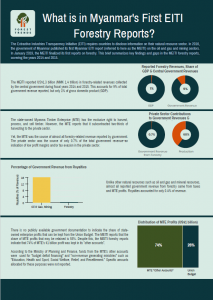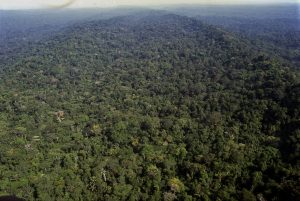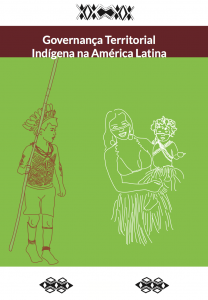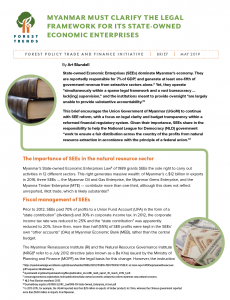What is in Myanmar’s First EITI Forestry Reports?
The Extractive Industries Transparency Initiative (EITI) requires countries to disclose information on their natural resource sector. In 2016, the government of Myanmar published its first Myanmar EITI report (referred to here as the MEITI) on the oil and gas and mining sectors. In January 2019, the MEITI finalized its first reports on forestry. This brief […]
Dependent Documents
Nós Arara Karo Rap: Nossa Terra E As Mudanças No Clima
We the Arara Karo Rap: Our Land And Climate Change
Developed from the materials produced in the workshops for the training of Cultural Mediators in the Ethno-environmental Corridor Tupi Mondé, on Climate Change and Territorial Management, this booklet was created to support the work of teachers in the indigenous schools of the Arara Karo Rap people and to help children understand the dynamics that surround […]
Nós, Paiter Suruí: Nossa Terra e As Mudanças Do Clima
We, the Paiter Surui: Our Land and Climate Change
Developed from the materials produced in the workshops for the training of Cultural Mediators in the Corridor Etnoambiental Tupi Mondé on the subject of Climate Change and Territorial Management, this booklet was created to support the work of teachers in indigenous schools in the Paiter Suruí community and help children understand the dynamics surrounding climate […]
Email Signup
Subscribe to any of Forest Trends’ mailing lists to keep up with the news, publications, and events that interest you.
Having Trouble?
If you experience any technical difficulties on our site, please contact Genevieve Bennett, Communications Manager.
Nós, Cinta Larga: Nossa Terra e As Mudanças do Clima
We, the Cinta Larga: Our Earth and Climate Change
Developed from the materials produced in the workshops for the training of Cultural Mediators in the Ethno-environmental Corridor Tupi Mondé, on Climate Change and Territorial Management, this booklet was created to support the work of teachers in the indigenous schools of the Cinta Larga people and to help children understand the dynamics that surround climate […]
Programa de Formação de Mediadores Culturais em Mudanças Climáticas e Gestão Territorial Povo Yawanawá
Cultural Mediators program in Climate Change and Territorial Management of the Yawanawa People
This document is the product of the Cultural Mediators program’s first workshop on Climate Change and Territorial Management. Its contents, texts, translations and most of the illustrations were made by its participants. The community decided that this material should be used for the schools of the Yawanawá people.
Programa de Formação de Mediadores Culturais em Mudanças Climáticas e Gestão Territorial Povo Noke Koi
Cultural Mediators Training Program in Climate Change and Territorial Management of the Noke Koi People
This document is the product of the program’s first workshop of Cultural Mediators in Climate Change and Territorial Management. Its content was made by the Noke Koi people and teachers.
Gobernanza Territorial Indígena en América Latina
Indigenous Territorial Governance in Latin America- Spanish Version
This book was created in the final year of the Accelerating Inclusion and Mitigating Emissions (AIME) program to gather perspectives on the key issues of indigenous territorial governance in Latin America. The book was written by the Forest Based Livelihood Consortium, supported by the USAID. The text reflects the experiences of indigenous organizations and associated […]
Governança Territorial Indígena na América Latina
Indigenous Territorial Governance in Latin America - Portuguese Version
This book was created in the final year of the Accelerating Inclusion and Mitigating Emissions (AIME) program to gather perspectives on the key issues of indigenous territorial governance in Latin America. The book was written by the Forest Based Livelihood Consortium, supported by the USAID. The text reflects the experiences of indigenous organizations and associated […]
Nós Kwazá Aikanã: Nossa Terra E As Mudanças No Clima
We the Kwazá Aikanã: Our Land and Climate Change
Developed from the materials produced in the Cultural Mediators workshops on climate change and territorial management, this booklet was created to support the work of teachers in the indigenous schools of the Kwazá people of the São Pedro River. The contents of this booklet seek to help children understand the dynamics related to climate change, the […]
Myanmar Must Clarify the Legal Framework for Its State-Owned Economic Enterprises
By Forest TrendsState-owned Economic Enterprises (SEEs) dominate Myanmar’s economy. They are reportedly responsible for 7% of GDP, and generate at least one-fifth of government revenue from extractive sectors alone. Yet, they operate “simultaneously within a sparse legal framework and a vast bureaucracy …lack[ing] supervision,” and the institutions meant to provide oversight “are largely unable to provide substantive accountability.” […]











